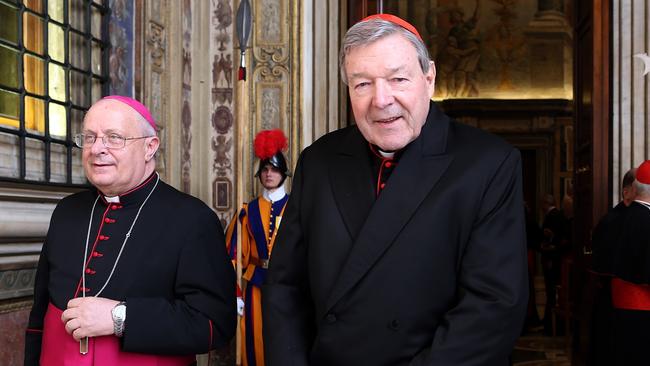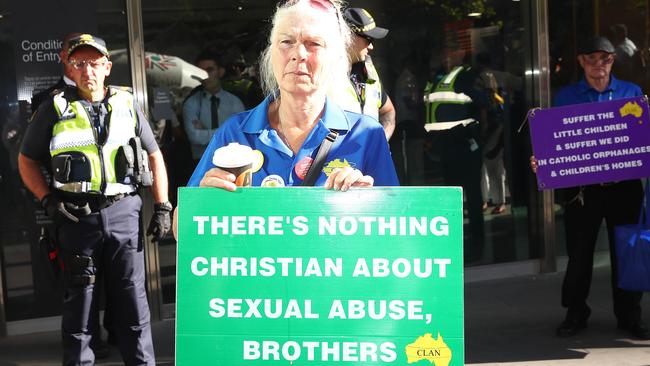Catholics mustn’t return to the culture of denial
While Cardinal Pell’s supporters strive to defend him and challenge our justice system, the consequences for victims are brutal, writes former Catholic priest Paul Hegerty.
Rendezview
Don't miss out on the headlines from Rendezview. Followed categories will be added to My News.
The Royal Commission into Institutional Child Sexual Abuse found that there were complaints against seven per cent of Catholic clergy over 60 years.
It is not unexpected, then, that a cleric is found guilty of child abuse. But the forthcoming conviction and imprisonment of Cardinal George Pell has generated controversy.
I was not surprised that Pell was found guilty, even though I don’t know him or have a view about his life. But given the courage of victims going to court, the professionalism of the police, the legal assessment of the public prosecutor, the oversight of a senior judge, and the evaluation by 12 Australians on a jury, I simply accepted the result at face value. For further reassurance, the defence has filed an appeal to test the validity of the verdict. Like others, I will wait to see how the appeal process unfolds and then move on with my life.
RELATED: Church must cough up every paedophile priest record
So the uproar around the verdict has me concerned. It sounds too much like the old culture that enabled serial child abusers in the church to get away with their crimes.
When I was a young man ministering in local communities, I sometimes dealt with complainants. Rather than encourage me to care for these wounded and sincere victims, senior church people advised me to avoid them.
I was told they were trouble makers, vindictive, delusional or liars.
I was not encouraged to take their stories seriously, let alone their suffering. I was expected to close ranks with the institution. I know the voices of the old culture and what they sound like.

A lot has changed since then.
After the royal commission, churches implemented serious changes. There are new policies. School staff receive annual training for dealing with child abuse. Parishioners in ministries undergo criminal history checks. There is a serious effort to make the church safer for children.
But now some of the chatter about the Pell trial echoes the old culture: How could the testimony of the victim be true? How could the court be competent? The accused is a good and highly respected man, how could anyone think him capable of such crimes?
While the intent of such voices is to defend someone they hold in high regard, or challenge the standards of the justice system, the consequences for victims are brutal.
For them the message is clear. When a church leader, with their social status and positional power, is accused of a crime, the victim doesn’t matter. The long, arduous legal journey doesn’t matter.
At the end of the day, do not believe the victim.
RELATED: Pell has washed away the work of good Catholics
As someone who now works in the field of culture, I wonder what provokes this response. Why does it persist in a church whose response to the child abuse epidemic should be driven by its deep tradition of repentance and renewal rather than a worldly entanglement with prestige and power?
Perhaps it is fear of lost certainty if church leaders and the faithful acknowledge how deeply corruption has infiltrated their ranks. Perhaps it is the anxiety of the 93 per cent of priests who will never hurt a child wondering how their profession could produce so many abusers.

Perhaps the faithful fear spiritual betrayal when those who guide them in their faith are sent to jail for crimes against children? And when it is Pell, an inspiration and champion for those religious and non-religious who hold deeply unpopular, rigorously conservative views, how their hearts must break to be told he is a sexual predator worthy of imprisonment. Their natural inclination to deny his guilt is understandable.
But Catholics must remember that the core of the Christian mystery is not prestige or self-righteousness. It is the suffering servant who gives their all for the sake of others.
This is what the church must do for victims.
It is time, especially as Lent, the season of repentance approaches, for the church to take the suffering to itself and rigorously confront its culture, so victims are not left to suffer because the church can’t handle its own truth.
RELATED: Victim impact statement submitted at Cardinal George Pell hearing
The administrative reforms for child protection are important but will not transform the church’s culture. Culture is not legislated, it is lived. It flows from deliberately chosen actions that eventually become normal, unquestioned behaviours. Globally this transition has barely started. Australia must take the lead but the reactions to the Pell conviction cast doubt on our readiness to do this.
Paul Hegerty is a former Catholic priest and consultant who works with organisational culture.
Originally published as Catholics mustn’t return to the culture of denial


